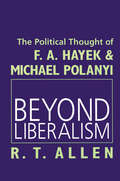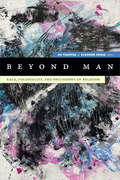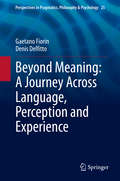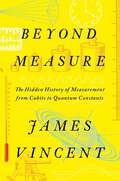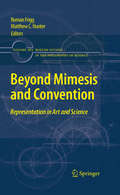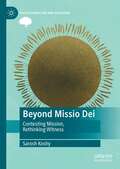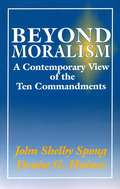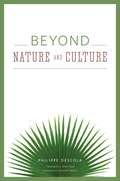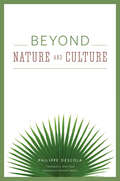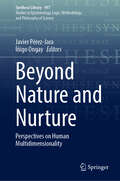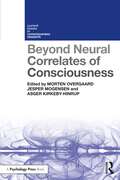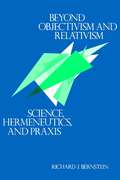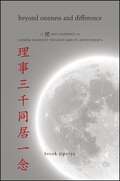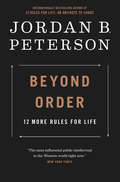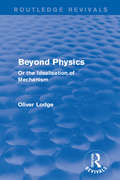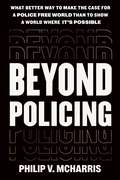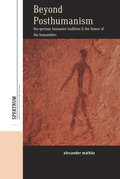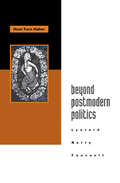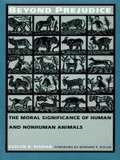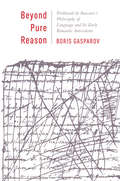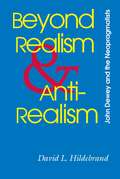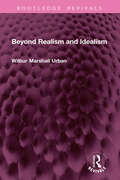- Table View
- List View
Beyond Liberalism
by R. T. AllenIn Beyond Nihilism, Michael Polanyi argued that a merely "negative" liberty of doing as one pleases so long as one does not impinge upon the equal liberty of others - must and has led to destructive nihilism and a fierce reaction to collectivism. R.T. Allen takes up this argument in Beyond Liberalism, and shows how Polanyi's political philosophy evolved into a more "positive" and distinctly conservative concept of liberty, converging upon the archetypal conservatism of Edmund Burke. Allen examines Polanyi's and F.A. Hayek's thinking with respect to the nature, value, and foundations of liberty.Negative and positive liberties are two sides of one liberty, and Allen believes negative conceptions of liberty are as dangerous as positive ones. He distinguishes among general and abstract definitions of liberty and shows how all, including that of Hayek, ultimately dissolve. According to Allen, only tacit conceptions of liberty, such as those of Burke and Polanyi, prove viable. This is because they rest on concrete tradition. Allen examines how the skeptical, rationalist, and utilitarian philosophies of Ludwig von Mises and Sir Karl Popper fail to support the value of liberty and even proved to be destructive of it. Allen argues that society cannot rely upon the classically liberal notion of contract but rather upon prescriptive and inherited obligations. In turn, this means that citizens have positive, as well as negative, duties to each other and the body politic of which they are part and upon whose support liberty depends.A free society is held together by emotional bonds and the traditions and rituals that sustain them. A free society also presupposes that the individual has inherent value in and for himself. For R.T. Allen, only Christianity, and certainly no modern philosophy, has a conception of the unique individual and his irreplaceable value and of a political order that transcends itself into the moral order. Even Polanyi's liberty is ultimately insufficient, for it gives no inherent value to the person himself but instead to the ideals which he serves. Beyond Liberalism challenges deeply ingrained notions of liberty and its meaning in modern society. It is a call for traditions of self-restraint and justice for their own sakes. This noteworthy volume is an essential addition to the libraries of political scientists, philosophers, and theologians alike.
Beyond Man: Race, Coloniality, and Philosophy of Religion (Black Outdoors: Innovations in the Poetics of Study)
by An Yountae and Eleanor CraigBeyond Man reimagines the meaning and potential of a philosophy of religion that better attends to the inextricable links among religion, racism, and colonialism. An Yountae, Eleanor Craig, and the contributors reckon with the colonial and racial implications of the field's history by staging a conversation with Black, Indigenous, and decolonial studies. In their introduction, An and Craig point out that European-descended Christianity has historically defined itself by its relation to the other while paradoxically claiming to represent and speak to humanity in its totality. The topics include secularism, the Eucharist's relation to Blackness, and sixteenth-century Brazilian cannibalism rituals as well as an analysis of how Mircea Eliade's conception of the sacred underwrites settler colonial projects and imaginaries. Throughout, the contributors also highlight the theorizing of Afro-Caribbean thinkers such as Sylvia Wynter, C. L. R. James, Frantz Fanon, and Aimé Césaire whose work disrupts the normative Western categories of religion and philosophy.Contributors. An Yountae, Ellen Armour, J. Kameron Carter, Eleanor Craig, Amy Hollywood, Vincent Lloyd, Filipe Maia, Mayra Rivera, Devin Singh, Joseph R. Winters
Beyond Meaning: A Journey Across Language, Perception and Experience (Perspectives in Pragmatics, Philosophy & Psychology #25)
by Gaetano Fiorin Denis DelfittoNatural languages – idioms such as English and Cantonese, Zulu and Amharic, Basque and Nicaraguan Sign Language – allow their speakers to convey meaning and transmit meaning to one another. But what is meaning exactly? What is this thing that words convey and speakers communicate? Few questions are as elusive as this. Yet, few features are as essential to who we are and what we do as human beings as the capacity to convey meaning through language. In this book, Gaetano Fiorin and Denis Delfitto disclose a notion of linguistic meaning that is structured around three distinct, yet interconnected dimensions: a linguistic dimension, relating meaning to the linguistic forms that convey it; a material dimension, relating meaning to the material and social conditions of its environment; and a psychological dimension, relating meaning to the cognitive lives of its users. By paying special attention to the puzzle surrounding first-person reference – the way speakers exploit language to refer to themselves – and by capitalizing on a number of recent findings in the cognitive sciences, Fiorin and Delfitto develop the original hypothesis that meaningful language shares the same underlying logical and metaphysical structure of sense perception, effectively acting as a system of classification and discrimination at the interface between cognitive agents and their ecologies.
Beyond Measure: The Hidden History Of Measurement From Cubits To Quantum Constants
by James VincentA vibrant account of how measurement has invisibly shaped our world, from ancient civilizations to the modern day. From the cubit to the kilogram, the humble inch to the speed of light, measurement is a powerful tool that humans invented to make sense of the world. In this revelatory work of science and social history, James Vincent dives into its hidden world, taking readers from ancient Egypt, where measuring the annual depth of the Nile was an essential task, to the intellectual origins of the metric system in the French Revolution, and from the surprisingly animated rivalry between metric and imperial, to our current age of the “quantified self.” At every turn, Vincent is keenly attuned to the political consequences of measurement, exploring how it has also been used as a tool for oppression and control. Beyond Measure reveals how measurement is not only deeply entwined with our experience of the world, but also how its history encompasses and shapes the human quest for knowledge.
Beyond Mimesis and Convention: Representation in Art and Science (Boston Studies in the Philosophy and History of Science #262)
by Matthew Hunter Roman FriggRepresentation is a concern crucial to the sciences and the arts alike. Scientists devote substantial time to devising and exploring representations of all kinds. From photographs and computer-generated images to diagrams, charts, and graphs; from scale models to abstract theories, representations are ubiquitous in, and central to, science. Likewise, after spending much of the twentieth century in proverbial exile as abstraction and Formalist aesthetics reigned supreme, representation has returned with a vengeance to contemporary visual art. Representational photography, video and ever-evolving forms of new media now figure prominently in the globalized art world, while this "return of the real" has re-energized problems of representation in the traditional media of painting and sculpture. If it ever really left, representation in the arts is certainly back. Central as they are to science and art, these representational concerns have been perceived as different in kind and as objects of separate intellectual traditions. Scientific modeling and theorizing have been topics of heated debate in twentieth century philosophy of science in the analytic tradition, while representation of the real and ideal has never moved far from the core humanist concerns of historians of Western art. Yet, both of these traditions have recently arrived at a similar impasse. Thinking about representation has polarized into oppositions between mimesis and convention. Advocates of mimesis understand some notion of mimicry (or similarity, resemblance or imitation) as the core of representation: something represents something else if, and only if, the former mimics the latter in some relevant way. Such mimetic views stand in stark contrast to conventionalist accounts of representation, which see voluntary and arbitrary stipulation as the core of representation. Occasional exceptions only serve to prove the rule that mimesis and convention govern current thinking about representation in both analytic philosophy of science and studies of visual art. This conjunction can hardly be dismissed as a matter of mere coincidence. In fact, researchers in philosophy of science and the history of art have increasingly found themselves trespassing into the domain of the other community, pilfering ideas and approaches to representation. Cognizant of the limitations of the accounts of representation available within the field, philosophers of science have begun to look outward toward the rich traditions of thinking about representation in the visual and literary arts. Simultaneously, scholars in art history and affiliated fields like visual studies have come to see images generated in scientific contexts as not merely interesting illustrations derived from "high art", but as sophisticated visualization techniques that dynamically challenge our received conceptions of representation and aesthetics. "Beyond Mimesis and Convention: Representation in Art and Science" is motivated by the conviction that we students of the sciences and arts are best served by confronting our mutual impasse and by recognizing the shared concerns that have necessitated our covert acts of kleptomania. Drawing leading contributors from the philosophy of science, the philosophy of literature, art history and visual studies, our volume takes its brief from our title. That is, these essays aim to put the evidence of science and of art to work in thinking about representation by offering third (or fourth, or fifth) ways beyond mimesis and convention. In so doing, our contributors explore a range of topics-fictionalism, exemplification, neuroaesthetics, approximate truth-that build upon and depart from ongoing conversations in philosophy of science and studies of visual art in ways that will be of interest to both interpretive communities. To put these contributions into context, the remainder of this introduction aims to survey how our communities have discretely arrived at a place wherein the perhaps-surprising collaboration between philosophy of science and art history has become not o...
Beyond Missio Dei: Contesting Mission, Rethinking Witness (Postcolonialism and Religions)
by Sarosh KoshyIn this book, Sarosh Koshy strives to go beyond the mission model of Christianity that emerged alongside and within the colonial enterprise and ethos since the sixteenth century. Rather than denounce the inheritance of the mission movement that transformed both the church and world in innumerable ways, it is a simultaneous expression of appreciation for this precious heritage, and an attempt to do justice by it through a yearning quest for relevant paradigms of Christian engagement.Indeed, there is an intense tension within this book, and in fact a twin tension at that. The tension is between those seeking to keep the current mission paradigm alive out of habit or as a self-serving device, thus corrupting and withering away a bequeathal that essentially set free the voluntary/independent spirit of Christian individuals and their intentional collectives from both the ecclesiastical and political authorities. On the other side are those who enlist mission both as a subsequent activity and as a basis to pursue innocuous, and at times apparently heroic options that would seemingly satisfy a supposed missional mandatory. This work enlists postcolonial and poststructuralist resources pedagogically, to teach of mission, missiology, World Christianity, and intercultural theology.
Beyond Moralism
by John Shelby SpongThis thought-provoking guide takes a candid look at the moral issues we face in our daily lives. Using the Ten Commandments as a starting point, the authors bring fresh analysis to such problems as the morality of war in a nuclear age, equitable tax structures, abortion, marital fidelity, capital punishment, care of aging parents, euthanasia, homosexuality, and other contemporary concerns. Beyond Moralism offers solid guidance that is consistent with the Word of God as heard throughout the ages.
Beyond Nature and Culture
by Philippe DescolaPhilippe Descola has become one of the most important anthropologists working today, and Beyond Nature and Culture has been a major influence in European intellectual life since its French publication in 2005. Here, finally, it is brought to English-language readers. At its heart is a question central to both anthropology and philosophy: what is the relationship between nature and culture? Culture--as a collective human making, of art, language, and so forth--is often seen as essentially different from nature, which is portrayed as a collective of the nonhuman world, of plants, animals, geology, and natural forces. Descola shows this essential difference to be, however, not only a specifically Western notion, but also a very recent one. Drawing on ethnographic examples from around the world and theoretical understandings from cognitive science, structural analysis, and phenomenology, he formulates a sophisticated new framework, the "four ontologies"-- animism, totemism, naturalism, and analogism--to account for all the ways we relate ourselves to nature. By thinking beyond nature and culture as a simple dichotomy, Descola offers nothing short of a fundamental reformulation by which anthropologists and philosophers can see the world afresh.
Beyond Nature and Culture
by Philippe Descola“Gives to anthropological reflection a new starting point and will become the compulsory reference for all our debates in the years to come.” —Claude Lévi-Strauss, on the French editionBeyond Nature and Culture has been a major influence in European intellectual life since its French publication in 2005. Here, finally, it is brought to English-language readers. At its heart is a question central to both anthropology and philosophy: what is the relationship between nature and culture?Culture—as a collective human making, of art, language, and so forth—is often seen as essentially different from nature, which is portrayed as a collective of the nonhuman world, of plants, animals, geology, and natural forces. Philippe Descola shows this essential difference to be not only a Western notion, but also a very recent one. Drawing on ethnographic examples from around the world and theoretical understandings from cognitive science, structural analysis, and phenomenology, he formulates a sophisticated new framework, the “four ontologies” —animism, totemism, naturalism, and analogism—to account for all the ways we relate ourselves to nature. By thinking beyond nature and culture as a simple dichotomy, Descola offers a fundamental reformulation by which anthropologists and philosophers can see the world afresh.“A compelling and original account of where the nature-culture binary has come from, where it might go—and what we might imagine in its place.” —Somatosphere“The most important book coming from French anthropology since Claude Lévi-Strauss’s Anthropologie Structurale.” —Bruno Latour, author of An Inquiry into Modes of Existence“Descola’s challenging new worldview should be of special interest to a wide range of scientific and academic disciplines from anthropology to zoology . . . Highly recommended.” —Choice
Beyond Nature and Nurture: Perspectives on Human Multidimensionality (Synthese Library #497)
by Javier Pérez-Jara Íñigo OngayThis book gathers several of the world&’s leading scholars in the nature vs. nurture debate, offering a timely reconsideration of the dynamic interactions between physical, chemical, biological, social, and cultural factors that shape human multidimensionality. Emphasizing this multidimensionality, this edited volume seeks to bridge the divide between biology and social theory—two research communities that have too often overlooked each other. These disciplines, despite being central to understanding human nature, have long operated in isolation. While some animal species exhibit higher degrees of phenotypic plasticity in specific traits, humans stand out as the most plastic species in both their neurological and sociocultural systems. This plasticity leads the contributors of this book to move beyond both biological reductionism and the blank-slate hypothesis. While biology undoubtedly plays a role in shaping and stabilizing human social and cultural processes, it does so only within the framework of an inherently social environment—one shaped by historically contingent and socially constructed realities, such as values, codes, and cultural perceptions. More importantly, cultural structures and social interactions actively shape and transform certain biological features that were once considered immutable. This book lays the groundwork for a productive dialogue among biologists, psychologists, social theorists, and philosophers. It also highlights some of the moral and political consequences of different perspectives within the nature vs. nurture debate. Through updated scientific and philosophical theorizing, the chapters in this book aim to overcome, once and for all, the simplistic yet persistent opposition between nature and nurture, offering a far more complex and dynamic—yet richer and epistemologically manageable—picture of the human being.
Beyond Neural Correlates of Consciousness (Current Issues in Consciousness Research)
by Jesper Mogensen Asger Kirkeby-HinrupDrawing on neuroscientific research and metacognitive theory, this groundbreaking volume examines the theoretical implications that are elicited when neural correlates of consciousness (NCC) are identified.The relationship between consciousness and the brain has concerned philosophers for centuries, yet a tacit assumption in much empirically minded consciousness research seems to be that if we can only develop a map of correlations, no further questions remain to be asked. Beyond Neural Correlates of Consciousness starts where others stop, by asking what these correlations may tell us about the nature of consciousness. The book contains chapters considering the upshots of finding the neural correlates of consciousness in light of the most prominent contemporary theories in the field. This illuminates the theoretical consequences of succeeding in the quest for the neural correlates of consciousness from the perspective of global workspace theory, higher-order thought theory, local recurrency theory, and REFCON models, in addition to considering how this quest is shaped by different conscious phenomena, such as dreaming, altered states of consciousness, and different levels of consciousness.This insightful text features sophisticated theories that goes beyond correlational inferences and neural mapping, and will be of interest to students and researchers of consciousness, particularly those interested in interpreting neural correlates.
Beyond Neural Correlates of Consciousness (Current Issues in Consciousness Research)
by Morten OvergaardDrawing on neuroscientific research and metacognitive theory, this groundbreaking volume examines the theoretical implications that are elicited when neural correlates of consciousness (NCC) are identified. The relationship between consciousness and the brain has concerned philosophers for centuries, yet a tacit assumption in much empirically minded consciousness research seems to be that if we can only develop a map of correlations, no further questions remain to be asked. Beyond Neural Correlates of Consciousness starts where others stop, by asking what these correlations may tell us about the nature of consciousness. The book contains chapters considering the upshots of finding the neural correlates of consciousness in light of the most prominent contemporary theories in the field. This illuminates the theoretical consequences of succeeding in the quest for the neural correlates of consciousness from the perspective of global workspace theory, higher-order thought theory, local recurrency theory, and REFCON models, in addition to considering how this quest is shaped by different conscious phenomena, such as dreaming, altered states of consciousness, and different levels of consciousness. This insightful text features sophisticated theories that goes beyond correlational inferences and neural mapping, and will be of interest to students and researchers of consciousness, particularly those interested in interpreting neural correlates.
Beyond Objectivism and Relativism
by Richard J. BernsteinDrawing freely and expertly from Continental and analytic traditions, Richard Bernstein examines a number of debates and controversies exemplified in the works of Gadamer, Habermas, Rorty, and Arendt. He argues that a "new conversation" is emerging about human rationality--a new understanding that emphasizes its practical character and has important ramifications both for thought and action.
Beyond Oneness and Difference: Li and Coherence in Chinese Buddhist Thought and Its Antecedents (SUNY series in Chinese Philosophy and Culture)
by Brook ZiporynBeyond Oneness and Difference considers the development of one of the key concepts of Chinese intellectual history, Li. A grasp of the strange history of this term and its seemingly conflicting implications—as oneness and differentiation, as the knowable and as what transcends knowledge, as the good and as the transcendence of good and bad, as order and as omnipresence—raises questions about the most basic building blocks of our thinking. This exploration began in the book's companion volume, Ironies of Oneness and Difference, which detailed how formative Confucian and Daoist thinkers approached and demarcated concepts of coherence, order, and value, identifying both ironic and non-ironic trends in the elaboration of these core ideas. In the present volume, Brook Ziporyn goes on to examine the implications of Li as they develop in Neo-Daoist metaphysics and in Chinese Buddhism, ultimately becoming foundational to Song and Ming dynasty Neo-Confucianism, the orthodox ideology of late imperial China. Ziporyn's interrogation goes beyond analysis to reveal the unsuspected range of human thinking on these most fundamental categories of ontology, metaphysics, epistemology, and ethics.
Beyond Order: 12 More Rules for Life
by Jordan B. PetersonThe highly anticipated sequel to the global bestseller 12 Rules for Life.In 12 Rules for Life, acclaimed public thinker and clinical psychologist Jordan B. Peterson offered an antidote to the chaos in our lives: eternal truths applied to modern anxieties. His insights have helped millions of readers and resonated powerfully around the world. Now in his long-awaited sequel, Peterson goes further, showing that part of life's meaning comes from reaching out into the domain beyond what we know, and adapting to an ever-transforming world. While an excess of chaos threatens us with uncertainty, an excess of order leads to a lack of curiosity and creative vitality. Beyond Order therefore calls on us to balance the two fundamental principles of reality--order and chaos--and reveals the profound meaning that can be found on the path that divides them.In times of instability and suffering, Peterson reminds us that there are sources of strength on which we can all draw: insights borrowed from psychology, philosophy, and humanity's greatest myths and stories. Drawing on the hard-won truths of ancient wisdom, as well as deeply personal lessons from his own life and clinical practice, Peterson offers twelve new principles to guide readers towards a more courageous, truthful, and meaningful life.
Beyond Personhood: An Essay in Trans Philosophy
by Talia Mae BettcherA bold intervention in the philosophical concepts of gender, sex, and selfBeyond Personhood provides an entirely new philosophical approach to trans experience, trans oppression, gender dysphoria, and the relationship between gender and identity. Until now, trans experience has overwhelmingly been understood in terms of two reductive frameworks: trans people are either &“trapped in the wrong body&” or they are oppressed by the gender binary. Both accounts misgender large trans constituencies while distorting their experience, and neither can explain the presentation of trans people as make-believers and deceivers or the serious consequences thereof. In Beyond Personhood, Talia Mae Bettcher demonstrates how taking this phenomenon seriously affords a new perspective on trans oppression and trans dysphoria—one involving liminal states of &“make-believe&” that bear positive possibilities for self-recognition and resistance. Undergirding this account is Bettcher&’s groundbreaking theory of interpersonal spatiality—a theory of intimacy and distance that requires rejection of the philosophical concepts of person, self, and subject. She argues that only interpersonal spatiality theory can successfully explain trans oppression and gender dysphoria, thus creating new possibilities for thinking about connection and relatedness. An essential contribution to the burgeoning field of trans philosophy, Beyond Personhood offers an intersectional trans feminism that illuminates transphobic, sexist, heterosexist, and racist oppressions, situating trans oppression and resistance within a much larger decolonial struggle. By refusing to separate theory from its application, Bettcher shows how a philosophy of depth can emerge from the everyday experiences of trans people, pointing the way to a reinvigoration of philosophy.
Beyond Physics: Or the Idealisation of Mechanism (Routledge Revivals)
by Sir Oliver LodgeOriginally published in 1930, Sir Oliver Lodge proposes a connection between physics and philosophy, or as he describes it, a key to unlock the intricate connection between mind and matter. A response to early twentieth century mathematically-led philosophy, Lodge looks at physics from a physical direction rather than from a theoretical model. This title will be of interest to students of philosophy as well physics.
Beyond Policing
by Philip V. McHarrisWhat would happen if policing disappeared? Would we be safe? This book imagines a world without police. It&’s evident that policing is a problem. But what is the best way forward? In Beyond Policing, distinguished scholar and writer Philip V. McHarris reimagines the world without police to find answers and reveal how we can make police departments obsolete. Beyond Policing tackles thorny issues with evidence, including data and personal stories, to uncover the weight of policing on people and communities and the patterns that prove police reform only leads to more policing. McHarris challenges us to envision a future where safety is not synonymous with policing but is built on the foundation of community support and preventive measures. He explores innovative community-based safety models (like community mediators and violence interrupters), the decriminalization of driving offenses, and the creation of nonpolice crisis response teams. McHarris also outlines strategies for responding to conflict and harm in ways that transform the conditions that give rise to the issues. He asks us to imagine a world where people thrive without the shadow of inequality, where our approach to safety is a collective achievement. McHarris writes, &“What if our response to crisis wasn&’t about control but about care? How can we create conditions where safety is a shared responsibility? How can we design justice so that no community is routinely oppressed? Envisioning such a world isn&’t just a daydream; it&’s the first step toward building a society where violence and fear no longer dictate our lives.&” Transformative and forward thinking, Beyond Policing provides a blueprint for a brighter, safer world. McHarris&’s vision is clear: we must dare to move beyond policing and foster a society where everyone has the resources to thrive and feel safe.
Beyond Posthumanism: The German Humanist Tradition and the Future of the Humanities (Spektrum: Publications of the German Studies Association #22)
by Alexander MathäsKant, Goethe, Schiller and other eighteenth-century German intellectuals loom large in the history of the humanities—both in terms of their individual achievements and their collective embodiment of the values that inform modern humanistic inquiry. Taking full account of the manifold challenges that the humanities face today, this volume recasts the question of their viability by tracing their long-disputed premises in German literature and philosophy. Through insightful analyses of key texts, Alexander Mathäs mounts a broad defense of the humanistic tradition, emphasizing its pursuit of a universal ethics and ability to render human experiences comprehensible through literary imagination.
Beyond Postmodern Politics: Lyotard, Rorty, Foucault
by Honi Fern HaberIn this book, Honi Haber offers a much-needed analysis of postmodern politics. While continuing to work towards the voicing of the "other," she argues that we must go beyond the insights of postmodernism to arrive at a viable political theory. Postmodernism's political agenda allows the marginalized other to have a voice and to constitute a politics of difference based upon heterogeneity. But Haber argues that postmodern politics denies us the possibility of selves and community--essential elements to any viable political theory.
Beyond Prejudice: The Moral Significance of Human and Nonhuman Animals
by Evelyn B. PluharIn Beyond Prejudice, Evelyn B. Pluhar defends the view that any sentient conative being--one capable of caring about what happens to him or herself--is morally significant, a view that supports the moral status and rights of many nonhuman animals. Confronting traditional and contemporary philosophical arguments, she offers in clear and accessible fashion a thorough examination of theories of moral significance while decisively demonstrating the flaws in the arguments of those who would avoid attributing moral rights to nonhumans.Exposing the traditional view--which restricts the moral realm to autonomous, fully fledged "persons"--as having horrific implications for the treatment of many humans, Pluhar goes on to argue positively that sentient individuals of any species are no less morally significant than the most automomous human. Her position provides the ultimate justification that is missing from previous defenses of the moral status of nonhuman animals. In the process of advancing her position, Pluhar discusses the implications of determining moral significance for children and "abnormal" humans as well as its relevance to population policies, the raising of animals for food or product testing, decisions on hunting and euthanasia, and the treatment of companion animals. In addition, the author scrutinizes recent assertions by environmental ethicists that all living things or that natural objects and ecosystems be considered highly morally significant. This powerful book of moral theory challenges all defenders of the moral status quo--which decrees that animals decidedly do not count--to reevaluate their convictions.
Beyond Pure Reason: Ferdinand de Saussure's Philosophy of Language and Its Early Romantic Antecedents (Leonard Hastings Schoff Lectures)
by Boris GasparovThe Swiss linguist Ferdinand de Saussure (1857–1913) revolutionized the study of language, signs, and discourse in the twentieth century. He successfully reconstructed the proto-Indo-European vowel system, advanced a conception of language as a system of arbitrary signs made meaningful through kinetic interrelationships, and developed a theory of the anagram so profound it gave rise to poststructural literary criticism.The roots of these disparate, even contradictory achievements lie in the thought of Early German Romanticism, which Saussure consulted for its insight into the nature of meaning and discourse. Conducting the first comprehensive analysis of Saussure's intellectual heritage, Boris Gasparov links Sassurean notions of cognition, language, and history to early Romantic theories of cognition and the transmission of cultural memory. In particular, several fundamental categories of Saussure's philosophy of language, such as the differential nature of language, the mutability and immutability of semiotic values, and the duality of the signifier and the signified, are rooted in early Romantic theories of "progressive" cognition and child cognitive development. Consulting a wealth of sources only recently made available, Gasparov casts the seeming contradictions and paradoxes of Saussure's work as a genuine tension between the desire to bring linguistics and semiotics in line with modernist epistemology on the one hand, and Jena Romantics' awareness of language's dynamism and its transcendence of the boundaries of categorical reasoning on the other. Advancing a radical new understanding of Saussure, Gasparov reveals aspects of the intellectual's work previously overlooked by both his followers and his postmodern critics.
Beyond Realism and Antirealism: John Dewey and the Neopragmatists (The Vanderbilt Library of American Philosophy)
by David L. HildebrandPerhaps the most significant development in American philosophy in recent times has been the extraordinary renaissance of Pragmatism, marked most notably by the reformulations of the so-called "Neopragmatists" Richard Rorty and Hilary Putnam. With Pragmatism offering the allure of potentially resolving the impasse between epistemological realists and antirealists, analytic and continental philosophers, as well as thinkers across the disciplines, have been energized and engaged by this movement.In Beyond Realism and Antirealism: John Dewey and the Neopragmatists, David L. Hildebrand asks two important questions: first, how faithful are the Neopragmatists' reformulations of Classical Pragmatism (particularly Deweyan Pragmatism)? Second, and more significantly, can their Neopragmatisms work?In assessing Neopragmatism, Hildebrand advances a number of historical and critical points:• Current debates between realists and antirealists (as well as objectivists and relativists) are similar to early twentieth-century debates between realists and idealists that Pragmatism addressed extensively.• Despite their debts to Dewey, the Neopragmatists are reenacting realist and idealist stands in their debate over realism, thus giving life to something shown fruitless by earlier Pragmatists.• What is absent from the Neopragmatist's position is precisely what makes Pragmatism enduring: namely, its metaphysical conception of experience and a practical starting point for philosophical inquiry that such experience dictates.• Pragmatism cannot take the "linguistic turn" insofar as that turn mandates a theoretical starting point.• While Pragmatism's view of truth is perspectival, it is nevertheless not a relativism.• Pace Rorty, Pragmatism need not be hostile to metaphysics; indeed, it demonstrates how pragmatic instrumentalism and metaphysics are complementary.In examining these and other difficulties in Neopragmatism, Hildebrand is able to propose some distinct directions for Pragmatism. Beyond Realism and Antirealism will provoke specialists and non-specialists alike to rethink not only the definition of Pragmatism, but its very purpose.
Beyond Realism and Antirealism: John Dewey and the Neopragmatists (Vanderbilt Library of American Philosophy)
by David L. HildebrandPerhaps the most significant development in American philosophy in recent times has been the extraordinary renaissance of Pragmatism, marked most notably by the reformulations of the so-called "Neopragmatists" Richard Rorty and Hilary Putnam. With Pragmatism offering the allure of potentially resolving the impasse between epistemological realists and antirealists, analytic and continental philosophers, as well as thinkers across the disciplines, have been energized and engaged by this movement. In Beyond Realism and Antirealism: John Dewey and the Neopragmatists, David L. Hildebrand asks two important questions: first, how faithful are the Neopragmatists' reformulations of Classical Pragmatism (particularly Deweyan Pragmatism)? Second, and more significantly, can their Neopragmatisms work? In assessing Neopragmatism, Hildebrand advances a number of historical and critical points: • Current debates between realists and antirealists (as well as objectivists and relativists) are similar to early twentieth-century debates between realists and idealists that Pragmatism addressed extensively. • Despite their debts to Dewey, the Neopragmatists are reenacting realist and idealist stands in their debate over realism, thus giving life to something shown fruitless by earlier Pragmatists. • What is absent from the Neopragmatist's position is precisely what makes Pragmatism enduring: namely, its metaphysical conception of experience and a practical starting point for philosophical inquiry that such experience dictates. • Pragmatism cannot take the "linguistic turn" insofar as that turn mandates a theoretical starting point. • While Pragmatism's view of truth is perspectival, it is nevertheless not a relativism. • Pace Rorty, Pragmatism need not be hostile to metaphysics; indeed, it demonstrates how pragmatic instrumentalism and metaphysics are complementary. In examining these and other difficulties in Neopragmatism, Hildebrand is able to propose some distinct directions for Pragmatism. Beyond Realism and Antirealism will provoke specialists and non-specialists alike to rethink not only the definition of Pragmatism, but its very purpose.
Beyond Realism and Idealism (Routledge Revivals)
by Wilbur Marshall UrbanFirst published in 1949, Beyond Realism and Idealism argues for a consistency of idealism with realism, or synthesis of the two positions which should retain the essential cognitive meanings and values of both. The argument of this book falls into two main parts: chapters one to six are concerned with the argument for the transcendence of the opposition and chapter seven to ten with an attempt to develop in detail a position which can be described as beyond realism and idealism. The method of the first part of the study is dialectical in the broad sense of the term and chapters seven to ten are of a different character. The final chapter, the Epilogue, discusses the significance of a transcendence of realism and idealism for modern culture and philosophy. This is an important read for scholars and researchers of philosophy.
